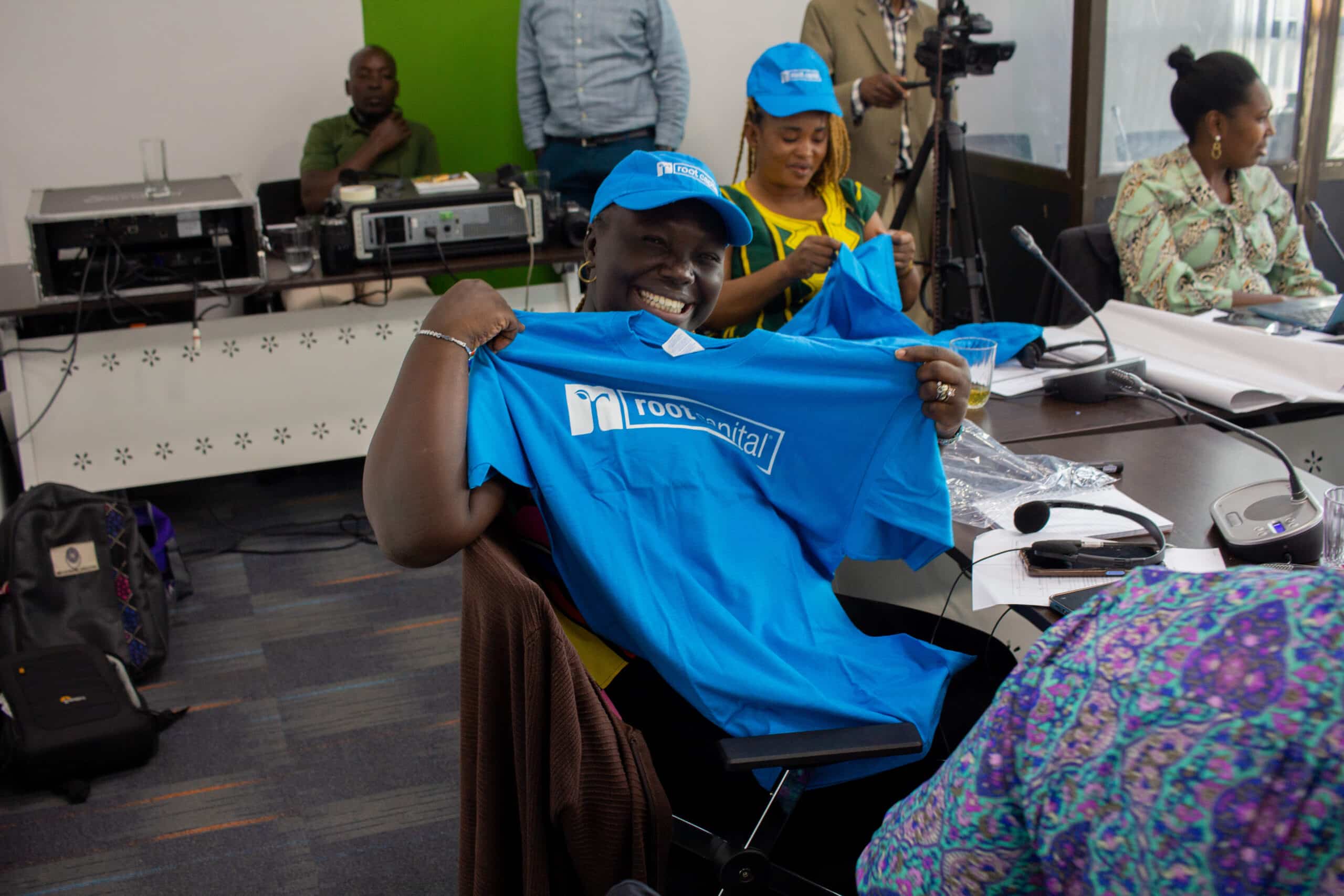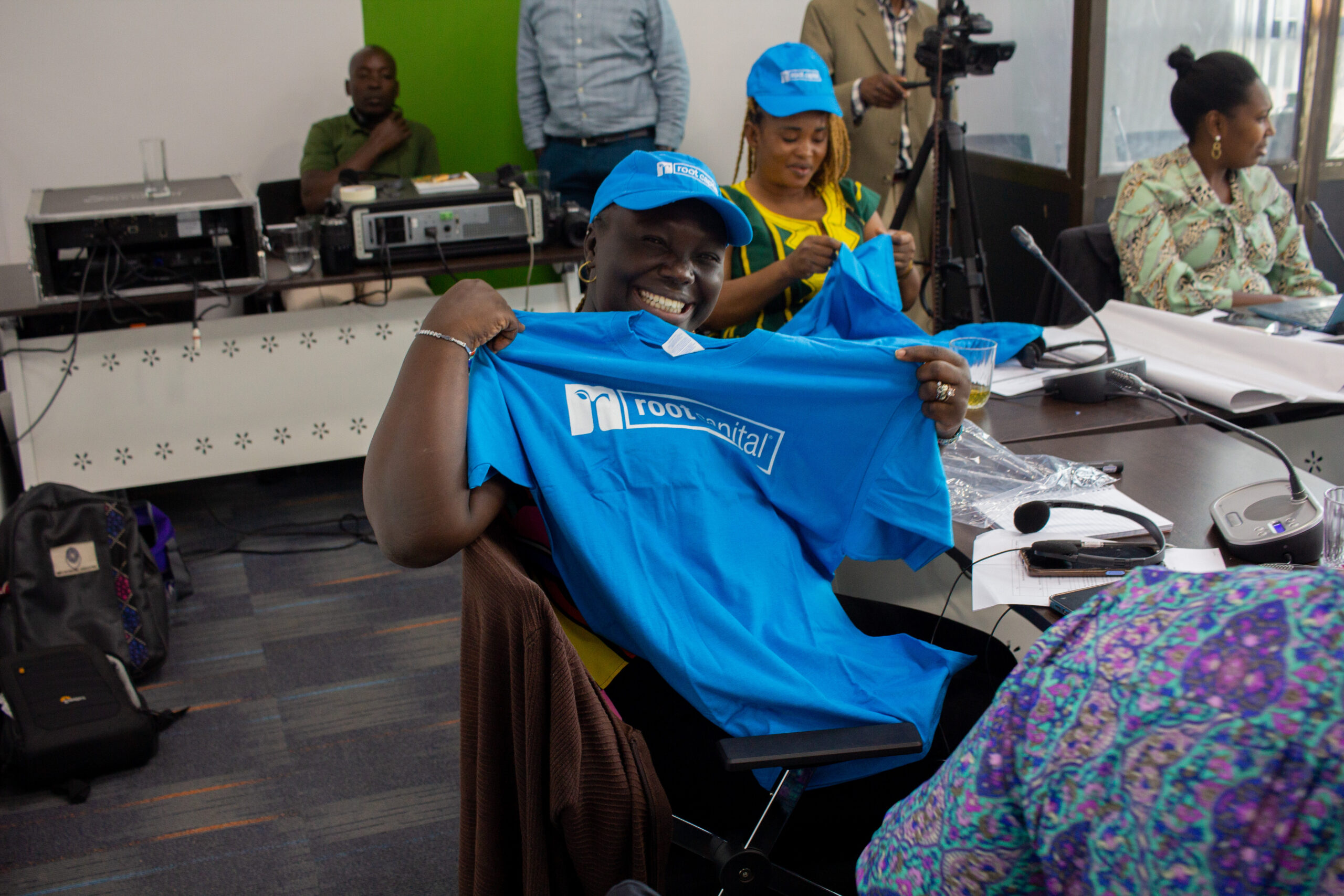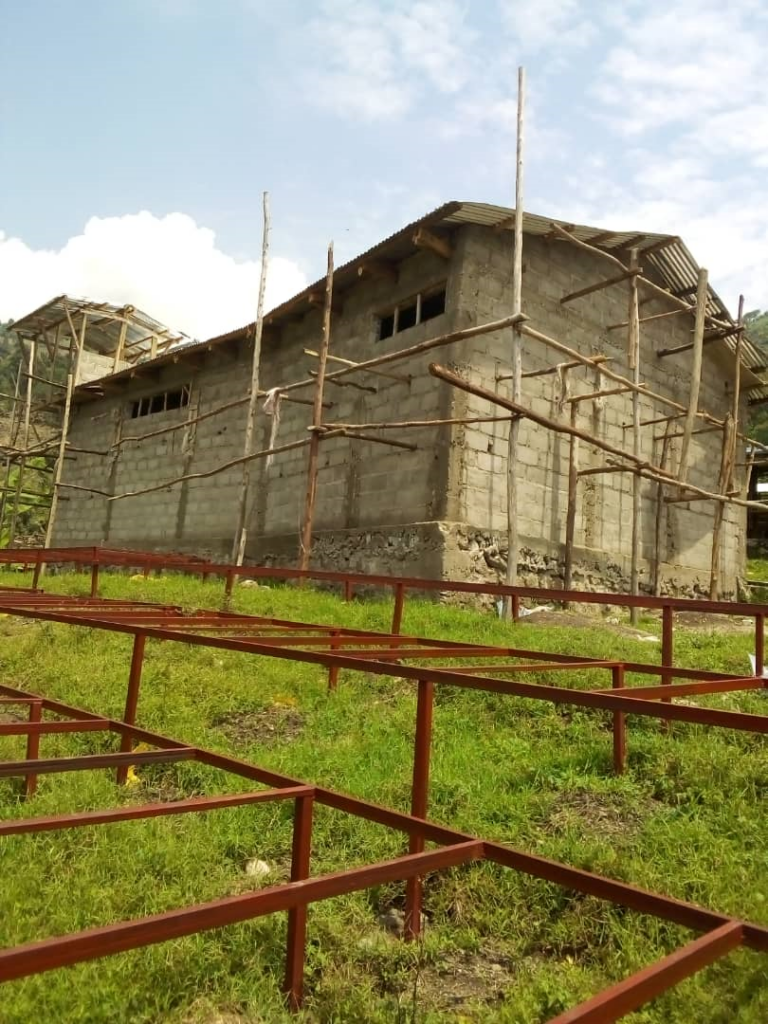
 Marcelline Budza at Root Capital’s Women’s Council gathering in Nairobi, Kenya. Credit: Root Capital
Marcelline Budza at Root Capital’s Women’s Council gathering in Nairobi, Kenya. Credit: Root Capital
In the lead up to International Coffee Day on October 1, we are sharing Rebuild Women’s Hope’s (RWH) story. Keep reading to learn more about this unique coffee cooperative that is on a mission to empower women in the Democratic Republic of the Congo (DRC).
In 1998, the DRC was plunged into a devastating civil war. Although the war officially ended in 2003, fighting and ethnic conflict have continued in the eastern DRC. Since 1996, the ongoing violence in the eastern DRC has resulted in approximately six million deaths. It was against this backdrop of conflict and unrest that Marcelline Budza founded RWH in 2013. Led by women coffee farmers on the large, remote island of Idjwi in Lake Kivu in the eastern DRC, RWH is a coffee cooperative with more than 3,050 members.
In the Wake of Violence, RWH Offers a Path Forward
Prior to RWH’s founding, local farmers struggled in the conflict-riddled zone of Idjwi. They had no way of processing their coffee and their only customers were smugglers, who ferried it across Lake Kivu to neighboring Rwanda. RWH addressed a critical gap in this rural community-working not only to improve the quality of coffee on Idjwi, but also opening up the local farmers’ coffee to new buyers and new markets for export.
The coffee cooperative’s primary goal, however, is to provide women, many of whom were left widowed following the war, with the necessary tools and resources they need to become financially independent in the coffee sector.
As a result of ongoing ethnic conflict and weak governance, many women in the DRC have been victims of sexual violence and rape, which are frequently used as weapons of war. Since women have borne the brunt of the challenges wrought by this violence, RWH is committed to actively promoting women’s rights, advocating for gender equality, and encouraging women to challenge societal norms and barriers that limit their opportunities. RWH also strives to ensure that women have access to holistic, wraparound support, such as reproductive and maternal health care and daycare services, so that they can have productive, fulfilling lives.
Founder and President Marcelline Budza believes that women working in the coffee industry possess an extraordinary inner strength that sets them apart. Their resilience and determination enable them to overcome challenges, find innovative solutions, and transform their communities.
In our organization, women oversee the whole coffee value chain, from planting and harvesting all the way to processing.”-Marcelline Budza, Founder and President of RWH
 Reconstructed drying beds at Rebuild Women’s Hope (RWH). Credit: Root Capital
Reconstructed drying beds at Rebuild Women’s Hope (RWH). Credit: Root Capital
Dismantling Gender Barriers
The biggest obstacle for women in the DRC’s coffee industry is the pervasive dominance of a male-oriented system. Women frequently encounter state-sanctioned and cultural hardships that undermine their opportunities, abilities, and worth. For example, despite the crucial role women play in the country’s agriculture sector, particularly in coffee farming and production, less than 3% of women in the DRC own agricultural land, per the UN. Changing this reality is not an easy task. Under traditional laws, men have assumed custodianship of agricultural land and women have no property rights over the land they farm.
This unfair gender-based treatment becomes particularly evident when women navigate coffee markets, where they are subjected to unjust scrutiny and skepticism. Men often struggle to understand that women can excel in business, leading to discriminatory treatment. Until recently, the laws were also not in women’s favor, as the Family Code in the DRC forbade women from signing a contract or working outside the home without their husband’s consent. As a result, very few women have access to decent jobs. An outlier as a woman leader in the DRC’s male-dominated coffee industry, Marcelline is often criticized by men for challenging traditional gender roles and encouraging women to assert independence from male authority figures, including their husbands.
Overcoming Early Challenges and Securing Financing
At the beginning, it was incredibly challenging for RWH to establish itself as a cooperative due to these prevailing societal gender roles that restricted women from engaging in economic or business endeavors. However, these barriers did not stop Marcelline. She realized early on that despite being initially constituted as an all-women’s cooperative, RWH needed mutual support from and cooperation with the men in the community in order to thrive. So, RWH began gradually accepting male cooperative members.
Marcelline worked diligently to secure financing and implement good business practices for RWH, so that the cooperative could grow and provide more community support for its farmer members. After a long search, Root Capital emerged as the perfect partner to meet their financial and advisory needs, enabling them to strengthen and establish solid foundations. In 2019, the cooperative received its first loan, which totaled $150,000, from Root Capital. Thanks to this financing, the business thrived-and the following year, RWH successfully established an affordable maternity center. This center is dedicated to providing assistance and resources to women who previously lacked access to such vital support.
RWH has flourished under Root Capital’s credit plus capacity model. In early 2023, RWH began receiving Root Capital’s advisory services, including business management and agronomic training. Thanks to on-site training workshops, RWH has streamlined their accounting, taxation, and financial processes, thereby improving overall operational efficiency. The cooperative also received a $14,000 resilience grant from Root Capital in 2021, which they used to reconstruct a coffee washing station destroyed by rainwater in a strong storm.
Resilience grants, which don’t require repayment, are critical for helping growing clients like RWH overcome climate impacts and other unforeseen obstacles that could otherwise put these small businesses in financial jeopardy.
 The reconstruction of RWH’s washing station and storage facility. Credit: Root Capital
The reconstruction of RWH’s washing station and storage facility. Credit: Root Capital
RWH is deeply committed to the Idjwi community and strongly believes in increasing women’s income, so that they can improve their standard of living. Likewise, Root Capital is committed to supporting RWH’s long-term growth and empowerment of women in agriculture. To that end, we provided a $300,000 loan to RWH earlier this year for seasonal working capital, so that this dynamic coffee cooperative can continue to give back to its local community and create a more inclusive environment for women working in coffee in the DRC.
The Keys to RWH’s Success
RWH now works directly with buyers from the U.S., Europe, and Asia, which enables the cooperative to provide their high-quality coffee to a global market. A key principle of their approach is ensuring that when a kilogram of coffee is sold, the money earned from the sale is given directly to their farmers. This transparent and fair practice empowers the farmers and enables them to reap the rewards of their hard work.
Marcelline’s strong leadership skills have propelled RWH to new heights. Under her management, the cooperative has secured the necessary machinery and capital to advance and improve farmer livelihoods. Marcelline aspires to become the top coffee farmer in her region to ensure that other women coffee farmers are supported and fairly compensated.
We are proud to partner with Marcelline and her transformative coffee cooperative-and we look forward to supporting RWH’s future growth!
About the Author
Kelly Acheson is the Manager of Content Development and Communications at Root Capital.
